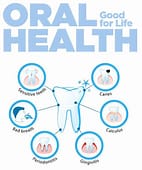
Why a healthy mouth matters more than you think
The world unites to celebrate World Oral Health Day on March 20 every year. The day is set aside for a global campaign to raise awareness about the critical role oral health plays in overall well-being. Yet, in many communities, oral hygiene remains an overlooked aspect of health, often dismissed until discomfort or severe complications arise. The theme of this year, A Happy Mouth is a Happy Body, reminds us that oral health is not merely about a bright smile, rather, it is an integral part of our general health and quality of life.
Oral health is a window to the body’s complete health. Dr Omolade Adekolurejo Chief Dental Surgeon at the State Specialist Hospital, Akure, Ondo State, states that by mere looking into the mouth a dentist could detect some diseases that plague a patient. Poor oral hygiene has been linked to systemic conditions such as diabetes, cardiovascular diseases, respiratory infections, and even complications during pregnancy. The mouth harbors bacteria, both beneficial and harmful, and when oral hygiene is neglected, infections can spread beyond the gums, leading to serious health issues.
The global health body, World Health Organization (WHO), says, over 3.5 billion people worldwide suffer from oral diseases, with untreated dental cavities being one of the most prevalent health conditions. In Nigeria, tooth decay, gum disease, and oral infections are widespread, yet access to dental care remains a challenge for many.
In a country where healthcare services are often overstretched, the consequences of poor oral health can be severe. The cost of treating advanced dental diseases is significantly higher than preventive care. Wisdom therefore underscores that prevention is better than cure. But many Nigerians only seek dental attention when pain becomes unbearable, leading to expensive treatments such as tooth extractions, root canals, or even surgery.
Oral health problems are not discriminatory. For children, tooth decay can lead to difficulty eating, speaking, and concentrating in school. Studies have shown that poor oral health in children affects their academic performance and self-esteem, highlighting the need for early intervention and preventive care. And for adults as in children, in addition to their self-esteem, it could lead to poor mental health and productivity.
The good news, however, is that most oral health issues can be prevented with simple, cost-effective measures. To improve their oral health, individuals and communities must take deliberate steps to: brush at least twice a day with fluoride toothpaste and floss daily. This will prevent cavities and gum diseases. Visiting a dentist at least twice a year for routine dental check-up helps detect and treat issues early, thereby preventing complications. Making healthy choice such as reducing sugary foods and drinks, eating a balanced diet rich in fruits and vegetables, and drinking plenty of water will promote strong teeth and gums. Smoking and excessive alcohol consumption increase the risk of gum disease and oral cancer. It is therefore common sense to bid farewell to these damning habits.
Promoting oral health requires collective efforts of all stakeholders. Government policies should prioritize access to affordable dental care, especially in rural and underserved communities. Schools, at all levels, must integrate oral hygiene education into their curriculum, while healthcare professionals should emphasize preventive care during routine consultations.
The private sector, including toothpaste manufacturers and health organizations, can contribute by supporting awareness campaigns, subsidising dental products, and funding community outreach programs. The media also plays a crucial role in disseminating accurate information about oral health and encouraging behavioural change.
As the world celebrates Oral Health Day, it is pertinent for Nigerians to commit to prioritizing their oral health. A healthy mouth surely contributes to overall well-being, confidence, and productivity. Hence, be it through individual hygiene practices or advocating for better dental care policies, everyone has a role to play in ensuring healthier smiles and healthier lives.
As the saying goes, prevention is better than cure. It is therefore essential to take charge of our oral health today for a brighter, healthier tomorrow.
